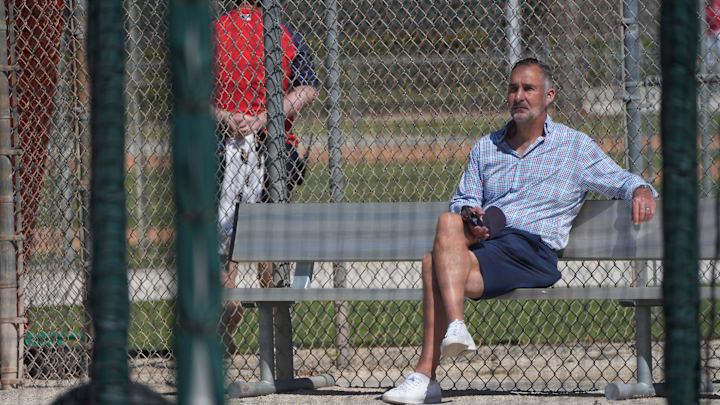Former Cardinals' minor leaguer Paul Schwendel sparked conversation on social media about the Cardinals' develop young pitchers, and I got a chance to ask him more about it
In case you missed it, The Athletics' Eno Sarris sparked some discussion on Twitter about how the Cardinals rank low in many of the advanced pitching metrics this year, causing a former pitcher from the organization, Paul Schwendel, to chime in with his thoughts.
A coach pulled us aside afterwards and told us that the analysts didn't see it that way and we should be trying to punch people out. Incoherent strategy in that org on the pitching front. They had pitching coaches with no idea how to use trackman (not Peoria PC, he was great)
— Paul Schwendel (@pschwendel10) May 3, 2023
I messaged Schwendel about his comments later that day, and he was gracious enough to give more insight on the way the Cardinals develop young pitching, and how it, at least as of 2021 when he pitched for them, was very outdated. Below is our conversation.
Josh Jacobs: The Cardinals have been public about their “pitch to contact” approach in recent years, what was your experience like working with minor league coaches and player development staff? Was there ever push back from yourself or other arms about this philosophy, and if so, how was it received?
Paul Schwendel: I would say when I was there that the Cardinals were more than a few years behind other teams in baseball on the pitching development side of things. It's been pretty obvious for a while now that smart teams chase swing and miss and velocity; because of Trackman/Rapsodo/Hawkeye and pitching tracking technologies, we're able to craft guys' arsenals around the ability to both miss bats and generate weak contact. For some orgs who are lagging behind on this, I think it's less of an "old school vs new school" thing and more of individuals who are at the head of player/pitching development not wanting to put in the effort to learn new technology and pitching development trends.
Jacobs: You mentioned there was a coordinator who didn’t take the time to learn about trackman/Rapsodo/new-age pitching techniques and training methodologies. Was that common among their coaches and player development? Did that ever change during your stint there?
Schwendel: I was only in the org for a few months. Our pitching coach at Peoria (where I was the entire time) was excellent; very knowledgeable on biomechanics, Trackman, the mental side of the game, etc. But we would have roving coordinators and the director of player development come to the clubhouse regularly who were completely out of touch with the modern game/player dev strategies. It seemed like there were voices, like Peoria's coaching staff, who were pushing for the Cards to get with the times, but player development executives who didn't care to.
Jacobs: How did your experience with the Cardinals compare to your experience with other organizations or independent player development groups?
Schwendel: I've been with the Cards and the Rangers in the minor leagues. The Rangers I was with from 2012-2014 so before kind of the whole tech boom in pitching dev. However, being 33 yrs old now I have a lot of friends in pitching development with other orgs and they were significantly ahead of the Cards while I was there. The Rays, Dodgers, Brewers, Yankees all have poured a lot of money into player development in recent years and I think it's pretty obvious looking at the arms they bring up.
Jacobs: You mentioned that coaches, specifically the staff in Peoria, were very knowledgeable in biomechanics, Trackman, the mental side of the game, etc. Were they able to help develop you and other pitchers with the knowledge they had, even when player development staff were giving different messages?
Schwendel: I would say it's tough because coaches aren't given much autonomy usually at the minor league level. Usually, there is an overall organizational philosophy that teams follow that comes from higher up; whether that's on the pitching, hitting, or strength and conditioning front. I think the on-field staff in Peoria was doing the best they could with the tools they were given, but the player development executives were a little behind at least on the pitching side.
Jacobs: This was all extremely helpful. Thanks, Paul. Is there anything else you’d like to share or comment on with this that I didn’t ask about?
Schwendel: Sure, no problem. I'd maybe add that I think the Cardinals' scouting department and hitting development seem to be pretty elite. Walker, Winn, Burleson, etc are really exciting prospects and you don't get those guys to the big leagues without doing something right.
Jacobs: For fans who don’t understand this side of the game, are there any helpful resources you would recommend they look into if they want to understand the “new-age” player development styles?
Schwendel: Driveline is a really good place to look; they put out a ton of free content: (link provided to Driveline here).
Also, one of the best pitching follows on social media is my buddy Ben Brewster, who I used to work with at his company Tread Athletics (You can follow Ben on Twitter @TrendAthletics)
My thoughts on our conversation...
On the next slide, I'll address some of my big takeaways from my conversation with Schwendel, but I wanted to publically thank Schwendel again for giving insight into his experience with the Cardinals during his time in Peoria. Seriously, check out Driveline and Ben Brewster if you're interested in learning more about the movements in player development and pitching analytics that the best teams in baseball are using today.
